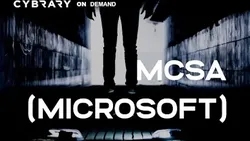
MSCA (Microsoft Certified Solutions Associate) Course 
Learn the basics of MSCA (Microsoft Certified Solutions Associate) Course ▼
ADVERTISEMENT
Course Feature
![]() Cost:
Cost:
Free
![]() Provider:
Provider:
Cybrary
![]() Certificate:
Certificate:
Paid Certification
![]() Language:
Language:
English
![]() Start Date:
Start Date:
On-Demand
Course Overview
❗The content presented here is sourced directly from Cybrary platform. For comprehensive course details, including enrollment information, simply click on the 'Go to class' link on our website.
Updated in [May 19th, 2023]
The Microsoft Certified Solutions Associate (MCSA) course provides students with the knowledge and skills necessary to install, configure, maintain, and troubleshoot a Microsoft Windows Server system. Students will learn how to deploy, manage, and monitor the server component that includes databases, applications, email, web services, and networks. Through lectures, demonstrations, and hands-on activities, students will gain an understanding of system administration, database administration, networking, and security. By the end of the course, students will be able to install and configure servers and services, deploy an Active Directory infrastructure, manage networks and applications, and keep systems secure.
[Applications]
Upon completion of the MSCA course, students should be able to apply their knowledge to a variety of real-world scenarios. They should be able to install, configure, and maintain Windows Server systems, deploy and manage Active Directory infrastructures, and secure networks and applications. Additionally, they should be able to troubleshoot server issues and monitor server performance. With the skills acquired from this course, students should be able to confidently manage and maintain Windows Server systems.
[Career Paths]
1. System Administrator: System Administrators are responsible for the installation, configuration, and maintenance of computer systems. They are also responsible for troubleshooting and resolving any technical issues that arise. With the knowledge gained from the MSCA course, System Administrators can be expected to have a strong understanding of Windows Server systems and be able to deploy, manage, and monitor them.
2. Database Administrator: Database Administrators are responsible for the design, implementation, and maintenance of databases. They are also responsible for ensuring the security and integrity of the data stored in the databases. With the knowledge gained from the MSCA course, Database Administrators can be expected to have a strong understanding of Windows Server systems and be able to deploy, manage, and monitor them.
3. Network Administrator: Network Administrators are responsible for the installation, configuration, and maintenance of computer networks. They are also responsible for troubleshooting and resolving any technical issues that arise. With the knowledge gained from the MSCA course, Network Administrators can be expected to have a strong understanding of Windows Server systems and be able to deploy, manage, and monitor them.
4. Security Administrator: Security Administrators are responsible for the implementation and maintenance of security policies and procedures. They are also responsible for ensuring the security and integrity of the data stored in the systems. With the knowledge gained from the MSCA course, Security Administrators can be expected to have a strong understanding of Windows Server systems and be able to deploy, manage, and monitor them.
The demand for these positions is expected to grow as organizations continue to rely on technology to run their businesses. As technology advances, the need for skilled professionals to manage and maintain these systems will also increase. Additionally, the need for security professionals to protect data and systems from malicious attacks will also continue to grow.
[Education Paths]
1. MS in Computer Science: A Master of Science in Computer Science (MSCS) is a degree program that focuses on the development of computer systems and applications. It covers topics such as software engineering, computer networks, operating systems, computer architecture, artificial intelligence, and database systems. This degree is ideal for those who want to pursue a career in software development, system administration, or network engineering. The demand for computer science professionals is growing, and the job outlook for this field is very positive.
2. MS in Information Technology: A Master of Science in Information Technology (MSIT) is a degree program that focuses on the development and management of information systems. It covers topics such as software engineering, database management, network security, web development, and system administration. This degree is ideal for those who want to pursue a career in information technology management, software development, or system administration. The demand for IT professionals is growing, and the job outlook for this field is very positive.
3. MS in Cybersecurity: A Master of Science in Cybersecurity (MSCS) is a degree program that focuses on the development and management of secure computer systems. It covers topics such as cryptography, network security, malware analysis, and digital forensics. This degree is ideal for those who want to pursue a career in cybersecurity, network security, or digital forensics. The demand for cybersecurity professionals is growing, and the job outlook for this field is very positive.
4. MS in Data Science: A Master of Science in Data Science (MSDS) is a degree program that focuses on the development and management of data-driven systems. It covers topics such as data mining, machine learning, data visualization, and predictive analytics. This degree is ideal for those who want to pursue a career in data science, data analytics, or machine learning. The demand for data science professionals is growing, and the job outlook for this field is very positive.
Course Provider

Provider Cybrary's Stats at AZClass
Discussion and Reviews
0.0 (Based on 0 reviews)
Explore Similar Online Courses

Discover: JavaScript Frameworks Behind the Scenes - Learn Interactively

Understanding Technology and Data

Python for Informatics: Exploring Information

Social Network Analysis

Introduction to Systematic Review and Meta-Analysis

The Analytics Edge

DCO042 - Python For Informatics

Causal Diagrams: Draw Your Assumptions Before Your Conclusions

Whole genome sequencing of bacterial genomes - tools and applications

Google Certification Training IT Support 2022 Full Course

Make $100k+ working from home with FREE Google Certification trainings


Start your review of MSCA (Microsoft Certified Solutions Associate) Course